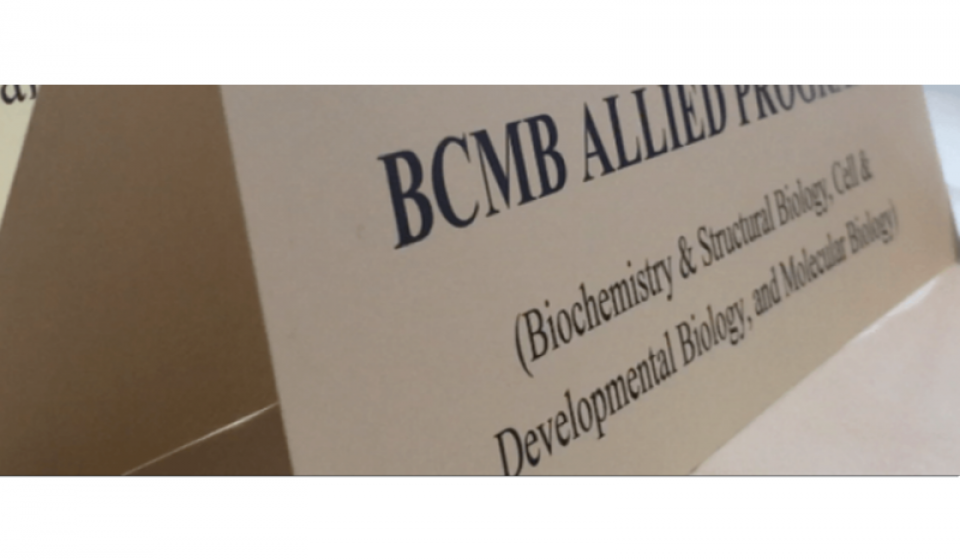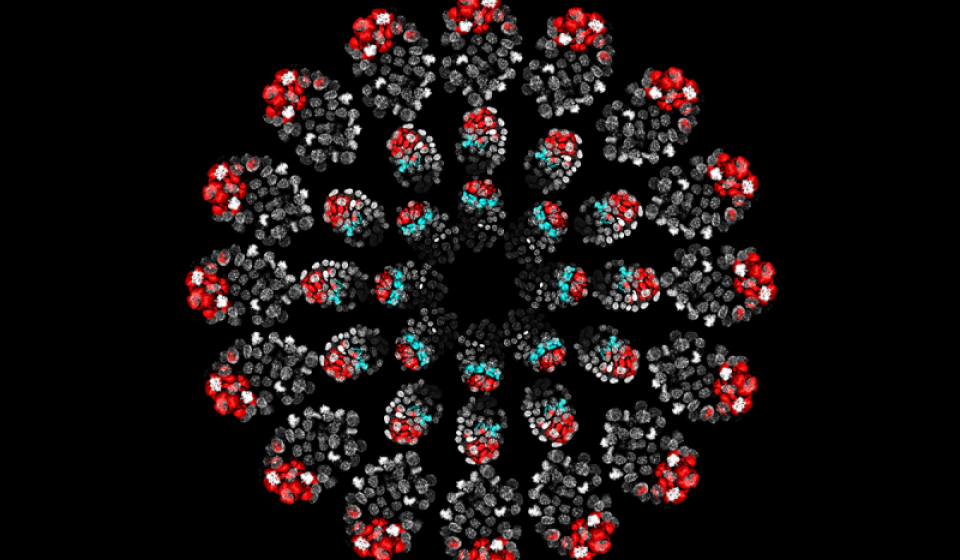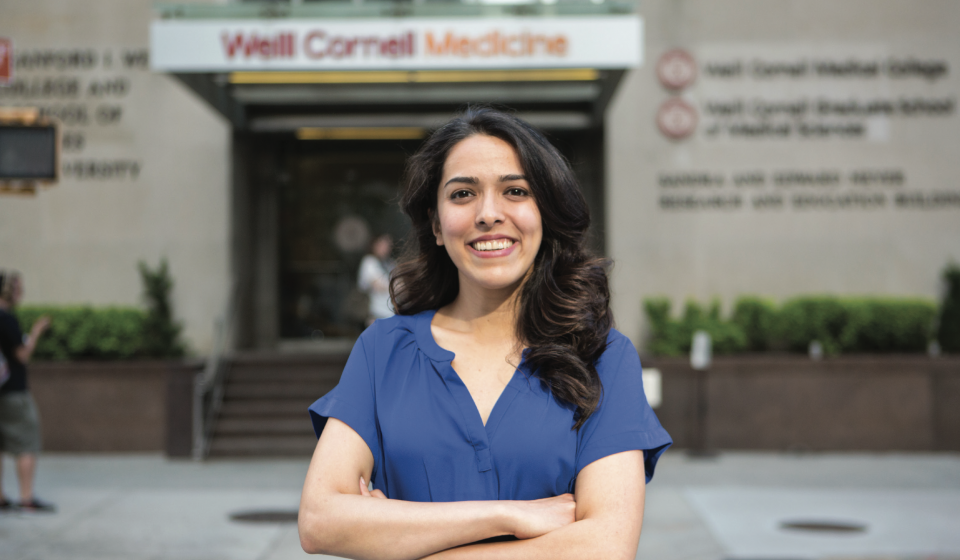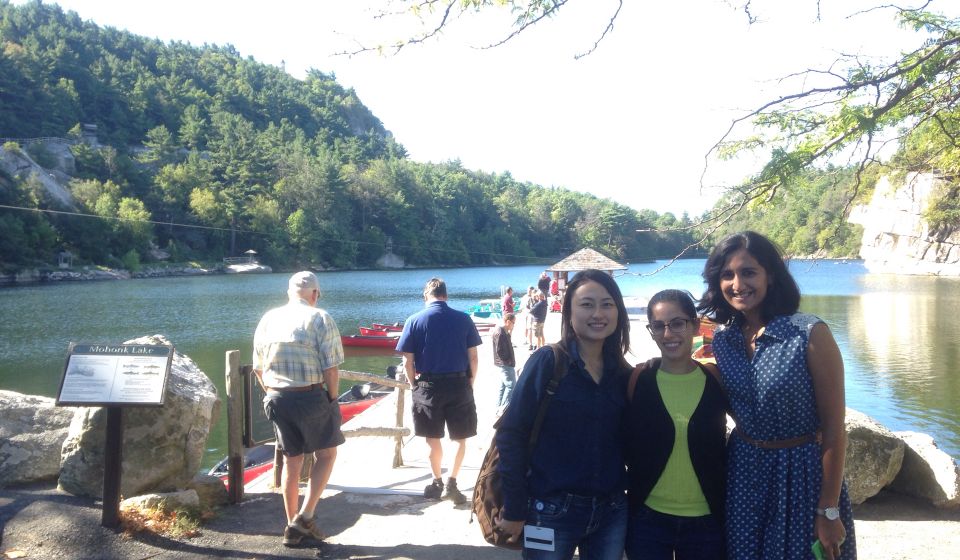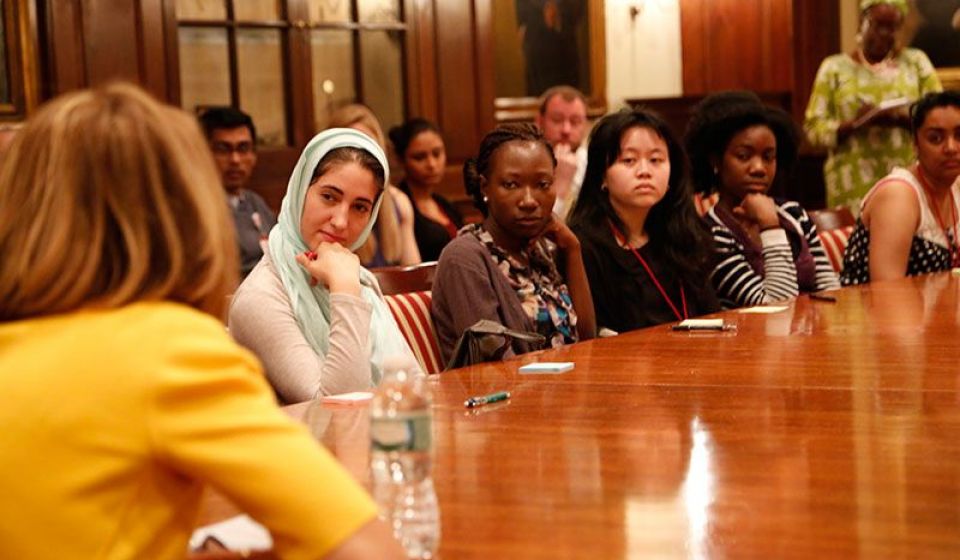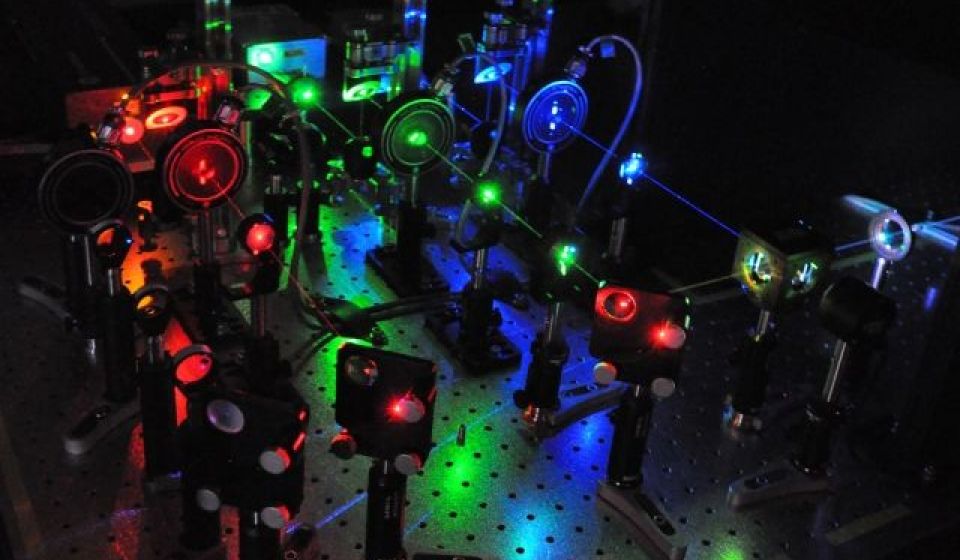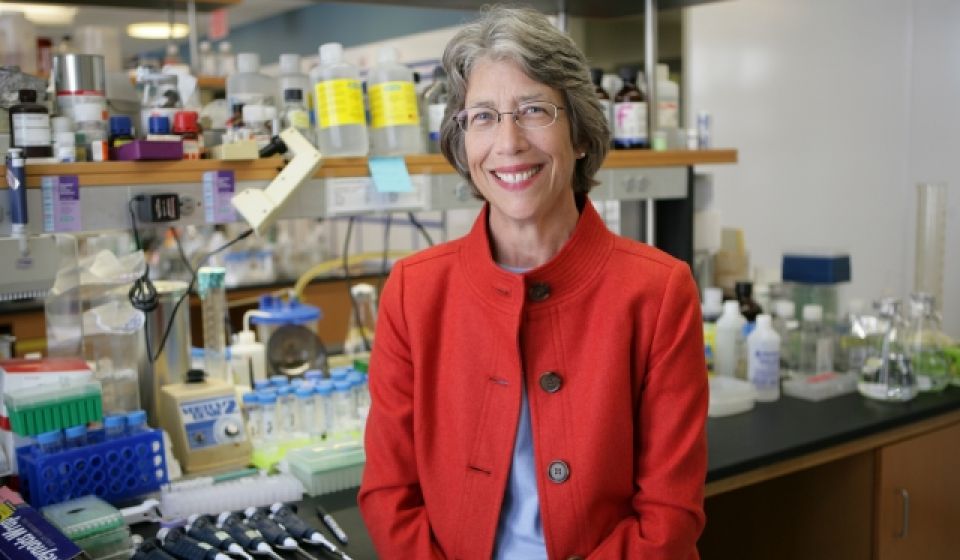The Biochemistry, Structural Biology, Cell Biology, Developmental Biology and Molecular Biology graduate programs at Weill Cornell Graduate School are collectively known as the BCMB Allied program. Students may affiliate with any of the three programs, however they are initially admitted to, and remain members of, the BCMB Allied program overall.
Biochemistry and Structural Biology
The Biochemistry, Structural Biology program offers opportunities for advanced training in the application of biochemical, structural, biophysical and imaging methods, to addressing questions relating to biological processes and mechanisms. Program members pursue vigorous research programs in the areas of membrane-protein structure and function, membrane trafficking and synaptic transmission, protein folding, intracellular and cell-surface signaling pathways, protein modification, membrane biochemistry and biophysics, DNA replication and repair, and RNA silencing and processing.
Many of the faculty conduct collaborative research bringing together knowledge and talent from different areas to focus on human diseases, such as cancer and neurodegenerative diseases. In this respect, research is focused on: understanding the roles of various signaling pathways in cancer, atherosclerosis and inflammation; the role of defective DNA repair in cancer-predisposition; and the link between defective protein folding and diseases, such as Alzheimer’s and Parkinson’s.
Cell and Developmental Biology
The Cell and Developmental Biology program comprises over 80 affiliated faculty members whose research focuses on a wide range of topics related to the control of normal and malignant cell growth, differentiation, tissue development and stem cell biology. Purified proteins, isolated cells and tissues, and whole organisms are all being exploited as model systems, assisted by computational methods, genomics and RNA profiling.
Common themes throughout many of the research activities include the control of gene expression, signal transduction, cell growth and apoptosis, cell polarity and migration, stem cell biology and cell-cell interactions. Four common research focuses highlight the breadth of the field and the current research of the program’s faculty:
- Cell biologists in the program study the dynamic regulation of intracellular trafficking, protein secretion, cell polarity, cell shape, oncogene function and cell-matrix interactions.
- Developmental biologists investigate germ cell differentiation, transcriptional repression in pattern formation, gene regulatory networks and morphogenesis of organ systems.
- Vascular biologists study molecular pathways that control cardiac development, blood vessel formation in embryonic and adult model systems, stem cell contributions to vascular development, and vascular cell signaling.
- The program’s neurobiologists focus on the formation of the notochord, patterning events in the developing cerebral cortex and neuronal precursor cells.
Molecular Biology
The Molecular Biology program offers opportunities to develop research training in the molecular pathways involved in control of cell growth, replication and responses to environmental changes. These pathways are remarkably intricate, tying together nearly all the fundamental processes of cellular metabolism. For example, the products of oncogenes, including both tumor-suppressing and tumor-enhancing genes, have been discovered to participate in pathways as seemingly diverse as signal transduction, repair of damaged DNA, regulation of gene expression and control of the cell cycle.
The programs’ internationally recognized faculty is comprised of nearly 40 members, whose diverse research interests can be grouped under three broad topics: (1) mechanisms of differentiation, growth control and development; (2) mechanisms of DNA replication, DNA repair and chromosome maintenance; and (3) transcriptional control of gene expression and mRNA biosynthesis.

Admissions
Applicants applying to any one of the BCMB programs (Biochemistry & Structural Biology, Cell & Developmental Biology and Molecular Biology) are automatically considered for admission to the BCMB Allied program. An applicant must have earned a baccalaureate degree or equivalent from a college or university of recognized standing, and show promise of ability to pursue advanced study and research, as judged by his or her previous record. Students are admitted once a year for the start of the academic year in the Fall, which is defined by the start of courses in September. The application process occurs in the preceding academic year (the application deadline is December 1st).
Admissions Process
After a completed application is received, the application and all supporting information are initially screened by an admissions committee of the program of study to which the student is applying. The strongest candidates are invited to attend the Graduate School’s interview days held in January and February. During these two-day periods, applicants experience program orientation, personal interviews and opportunities to interact with fellow applicants, current graduate students and faculty.
Following interviews, each program forwards recommendations on candidates for acceptance to the Graduate School Dean for final decision, who then notifies candidates of their acceptance. The final date for acceptance is April 15. To learn more about WCGS admissions process, click here.
Becoming a Doctoral Candidate
Details of program requirements and procedures may be found in the sections below.
Requirement Overview
In their first year, BCMB Allied students take the program's core curriculum courses in molecular genetics, biochemistry and structural biology, cell biology and gene structure/function, and logic and critical analysis. They also participate in a graduate research seminar. A course list and course descriptions are available at: Courses.
Lab rotations are an important component of the students' first year as well. Each student completes three laboratory rotations, which help him/her decide on a research focus and select a thesis mentor by the end of the first year.
The choice of a mentor determines the student's program assignment: Biochemistry & Structural Biology, Cell & Developmental Biology, or Molecular Biology. The mentor helps the student select his/her Special Committee, consisting of the mentor and two other faculty members knowledgeable in the student's research field. The committee evaluates the student's research and progress through the rest of his/her WCGS career. Selection of the mentor and the committee typically occurs before the student starts the second year of study.
In spring of the second year, the student takes the Admission to Doctoral Candidacy Examination (ACE), which includes a written component (a research proposal) and an oral examination, in which the student defends the proposal and demonstrates general knowledge. Committees made up of program faculty members administer the written and oral ACE. When a student passes the ACE, she/he is a candidate for the PhD degree.
PhD Degree and Research
Within six months of passing the ACE, the student must submit a five-page thesis project description to the Special Committee and meet with the committee for its approval. Thereafter, the student and the committee meet together regularly - at least annually - from year two until the student's graduation.
During the second through fourth years, while working in the laboratory, the student must also complete one elective course (two quarters) and participate in in-depth focus groups, which examine topics relevant to the fields of biochemistry, cell biology and molecular biology.
The culmination of the student's successful progression through the program is the final examination (the "defense") and certification by the Special Committee that the thesis represents an official piece of research that satisfies the requirements of the WCGS for the PhD degree.
Academic Timeline
To learn more about the program, research topics, and affiliated faculty for each program, review the sections below.
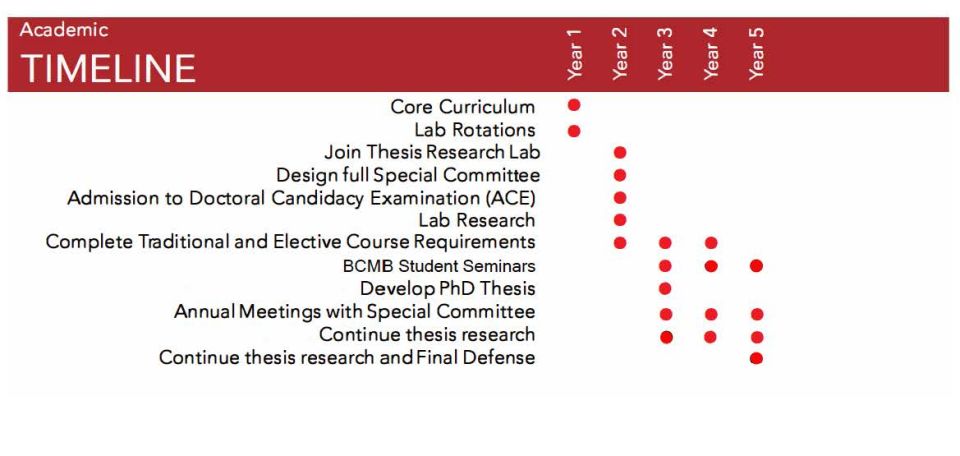
First Year Curriculum
During the first year, BCMB Allied students must complete the program’s core curriculum courses and a minimum of three (3) lab rotations. Program course descriptions are listed below. Lab rotations are an important component of the students’ first year in that they help him/her to decide on a research focus and select a thesis mentor, which is required by the end of the first year.
Courses
Biochemistry and Structural Biology Bootcamp
This course covers equilibria, bond formation, chemical and enzyme kinetics, enzyme reaction mechanism, ligand binding, protein chemistry and structure, nucleic acid chemistry and structure, principles of protein purification, principles of macromolecular analysis, principles of macromolecular recognition and specificity, membrane biochemistry, metabolic pathways and principles of small molecule analysis.
Molecular Genetics Bootcamp
This course is organized around the principles of genetic analysis, with examples chosen from organisms that best illustrate those principles. The course is based on lectures, problem sets and discussion sections. Topics covered include: the nature of the gene, linkage and physical maps, recombination mechanisms, nature of mutations, mutations as tools to dissect gene function, transposition, epigenetics, cancer genetics, genetic analysis of development and cell-cell signaling.
Logic and Critical Analysis
This course is designed to promote the critical analysis skills necessary to be a successful scientist. Students read papers from the primary literature and discuss the experiments described. Questions addressed are:
- “What was the hypothesis?”
- “What were the experiments designed to test?”
- “What other information is necessary to interpret the experiment?”
- “Do the experiments accomplish their goals?”
- "What problems exist in the experiments?”
- “Where might you go from here?”
To develop critical analysis skills, the first group of presentations will emphasize one or two figures only in each paper. Subsequently, two to three papers will be assigned as a thematic group by each instructor and will be discussed sequentially.
From Genes to Cells
This course is Module I of a two-part course that explores the regulatory mechanisms that govern information flow all the way from DNA to cells, involving eleven, week-long topics including: DNA replication and repair, transcription and RNA splicing, mRNA processing and translation, quality control, cytoskeleton, membranes, metabolism, and aspects of cellular homeostasis. The course will be taught in a new format involving primarily literature-based learning, where research papers are matched to each of two lectures on a week-long topic and examined by classroom-based discussion.
From Cells to Organisms and Diseases
This course is Module II of a two-part course that explores how groups of cells function and are arranged within organisms, and mechanisms of cell dysfunction that lead to disease, involving eleven, week-long topics including: cell division and cell death, cell adhesion, cell signaling, mechanisms of organismal development, stem cells, aging-related disorders, infection, and cancer. The course will be taught in a new format involving primary literature-based learning, where research papers are matched to each of two lectures on a week-long topic and examined by classroom-based discussion.
Lab Rotations
Lab rotations are an important component of a student’s first year curriculum. It is a chance for students to learn new techniques, to demonstrate one’s curiosity for scientific research and reasoning, and more importantly, determine whether a lab is a good match for them. It is also a time for a rotation mentor to evaluate a student’s ability to complete bench research and their understanding of the technical and theoretical aspects of the project, as well as the broader set of questions being addressed in the lab.
Each student completes three laboratory rotations. At the end of each lab rotation, students prepare a brief lab report (a maximum of 2 pages, single spaced) and a written evaluation submitted by the rotation mentor to the program coordinator. Submission of all three rotation reports and evaluations are required to remain in good academic standing and to progress to the elective courses and the qualifying exam!
Biweekly First Year Meetings
All first year students meet biweekly as a group with the First year Mentors and Co-Directors. These first year meetings focus on developing scientific presentation skills: each first year student presents several 10 minute chalk talks featuring their rotation projects over the course of the year. Fellow students are encouraged to ask questions and critique each presentation. Held over dinner, these meetings also offer the students an opportunity to discuss the courses and lab rotations in an informal setting.
Good Standing Within the BCMB Program
To remain in good academic standing in the Programs, students must achieve a grade of B or better (High Pass) in each required course and maintain a High Pass average in all course work. A grade of Low Pass or Fail is unacceptable and automatically results in the student being placed on academic probation status. A grade of fail also immediately places the student “on notice” and they are required to petition the Chair of the Curriculum Committee for an appointment to answer questions and offer explanations. Completed rotation reports are also required to remain in good standing. Students in the 2nd year or above are also required to have a thesis mentor to remain in good standing. Students in the 3rd year or above are required to present annually at a scientific meeting (see item J below) and to complete an annual Special Committee meeting to remain in good standing. If a student at any point fails to meet the requirements for good standing, they are automatically placed on academic probation and either the Curriculum Committee or another appropriate committee empowered by the Curriculum Committee will meet to discuss the case and can make one of three recommendations to the Dean: i) that the student be prescribed a course of action for returning to good standing, ii) that the student be allowed to continue to pursue a Ph.D., iii) that the student be asked to leave the Programs. Students will be informed of theses actions from the Faculty immediately. If a student is allowed to attempt to return to good standing, the student will remain on probation until fulfilling all of the specified requirements to the satisfaction of the Curriculum Committee.
First Year Review
The progress of all 1st year students is reviewed by the program directors at the end of the first year and reported to the curriculum committee. If a student has encountered difficulties during the 1st year curriculum, leading to the student being placed on academic probation, the student’s case will be re viewed by the full curriculum committee. The main purpose of this review is to identify the strengths and weaknesses of each student, so that, if possible, the student and faculty can work together to remedy any deficiency in training. At the end of the review, the committee will make a decision regarding the resolution of the student’s probation status, which can range from prescribing a course of action to remediate any evident weaknesses (examples include requiring the student to re-take courses or attend specific focus groups, or recommending that the student be dismissed from the program). The student will receive a formal letter describing the committee’s decision, which will be placed in his/her graduate school file.
Second Year Curriculum
The requirements for year 2 in the BCMB program focus on three important areas: a quantitative biology course, the Admission to Candidacy Exam and thesis research in the student’s chosen lab.
Courses
Quantitative Understanding in Biology (qBio)
Beginning in Fall 2015, all students enrolled in PhD programs within the Weill Graduate School of Biomedical Sciences are required to complete a one quarter course in Biostatistics. For BCMB students, this course will be taken during Quarter I of their second year in the program.
The qBio course will prepare students to apply quantitative techniques to the analysis of experimental data and the modeling of biological systems. To emphasize both practical and theoretical skills, the material will be presented whenever possible in a hands-on workshop style, and the completion of several projects by the students will be required. Topics include: practical aspects of data formatting and management; communication of quantitative concepts (verbal, graphical and mathematical); a review of statistics, with emphasis on the selection of appropriate statistical tests; the use of modern software packages; the interpretation of results; the formulation, evaluation and analysis of mathematical models of biological function, with an emphasis on linear and non-linear regression, determination of model parameters; and the critical comparison of alternative models with regard to over-parameterization. The formal components will introduce (and demystify) ordinary and partial differential equations and basic principles of non-linear dynamics, in order to enable quantitative modeling in biological arenas such as neural function, enzyme kinetics, cardiac dynamics and signaling pathways. Additional special topics will also be presented (e.g., control theory, machine learning, information theory, and image analysis) and their application will be illustrated with ongoing research in the laboratories of participating faculty.
Admission to Doctoral Candidacy Examination (ACE)
ACE Description
The Admission to Doctoral Candidacy Examination (ACE) is composed of two components, a written component (a research proposal) and an oral examination in which the student defends the proposal. Both components develop critical skills necessary for a successful Ph.D. student.
A student must be in good academic standing to take the ACE. For the written exam, the student prepares a research proposal on a topic selected by the student and approved by the ACE Committee. The ACE Committee consists of several faculty members whose membership on the committee rotates. The written proposal is reviewed by the ACE Committee and returned to the student with a written critique. The oral exam tests the student's ability to respond to comments in the critique, as well as the student's general knowledge. The Examining Committee for the oral consists of five faculty members: the Special Committee (i.e. the research mentor and two additional faculty members), a chair, and one additional member. At least one of the five members is also a member of the ACE Committee. Before taking the ACE, students must have completed the core sequence of courses; however, they need not have completed their elective courses. The ACE is taken during the Spring of the second year. The official description of the requirements and procedures for the ACE is contained in a separate document that will be provided to students upon completion of their first year requirements.
No later than six months after completion of the ACE, each student is required to convene her/his first Special Committee meeting (see below for composition of the Special Committee). In addition, the student is required to prepare a written document outlining the thesis hypothesis, some background information, and a brief description of the experimental approach (i.e., rationale and anticipated and possible unanticipated results, etc.). This document should be no longer than 5 pages, excluding illustrations and references. It must be submitted to the Special Committee members at least one week in advance of this meeting. At the meeting, the student should be prepared to discuss in depth the background (general and specific) of the project, approaches that will be taken, and what has already been accomplished. This meeting will serve as a mechanism to ensure that the Thesis Project is outlined and that the student has considered the biological relevance of the project. It will also serve to familiarize the Committee with the student's project and to allow the committee to provide constructive comments. The 5 page document must be approved by the committee. A brief report will be completed by one of the committee members (not the thesis mentor) and returned to the Program Coordinator, along with a copy of the document, for forwarding to the Program Directors. Completion of the post-ACE first Special Committee meeting is required to remain in good academic standing.
ACE Topic Choice
The topic is up to the student, with the following advisory considerations: It is the student's privilege to have flexibility and latitude in choice of the ACE topic. However, it is the student's responsibility to convincingly demonstrate independence of thought. The closer the ACE topic is to research projects previously conceived by the student's mentor or already being conducted in the host laboratory, the more difficult it may be to establish the independence of the student's thinking. However, it is often the case that the ACE is taken at a point when the thesis topic is not defined or the thesis topic that was initially chosen does not pan out. An independently-conceived ACE topic may give shape to or even become a thesis topic; this is welcomed.
The only restriction on topic choice is that all portions of the document must be written entirely independently from the student's mentor. While the student is encouraged to build on work previously conducted in the host laboratory, direct incorporation of specific aims, hypotheses or conclusions from a previously written grant application from the mentor (or anyone else) is not allowed. The mentor must certify that the specific aims were developed and written independently, and that the content of the ACE proposal was not "lifted" from a pre-existing research plan. The student will be held responsible for all ideas expressed in the proposal, and will be expected to explain, justify and defend all concepts described in the written document.
A suitable topic is one that incorporates experimentally testable models or hypotheses, is amenable to rational experimental design, and results in more than one predictable outcome for the experiments. Research topics that are seen as "fishing expeditions" or are not hypothesis-driven will generally not be approved.
As noted above, the lab head will be given the proposed aims and the completed written exam. For the student to proceed, the lab head must attest that the aims were prepared independently and that they reflect the original work of the student.
Special Committee
Once a thesis mentor has been agreed upon (which should occur by July 1), the student, in consultation with the mentor, forms a Special Committee composed of the thesis mentor and two additional faculty members. This committee acts to evaluate a student's research and should also serve as an informational resource to the student. Special Committee forms are available from the graduate office (Cornell A -131) or on the Graduate School Website.
A Program Director must sign these forms, which are then returned to Program Coordinator, who files them with the Dean's office. Any subsequent changes must be approved by a student's mentor and the appropriate Program Director, and be indicated on the form on file in the Dean's office.
The Special Committee must meet at least once per year from year 2 through graduation. Annual special committee meetings are a requirement for remaining in good academic standing. For each Special Committee meeting (following the one that occurs within 6 months of completing the ACE), the student should prepare a 1-2 page written outline of progress and future goals. This must be submitted to all committee members prior to the meeting.
Thesis Research
During the second year in the program, the student will begin work on a thesis project under the guidance of the Thesis mentor/Major Sponsor. Preparation and defense of the ACE will be invaluable for setting the course of the thesis work over the next 4 years.
Formal Presentations of Scientific Data
The ability to accurately and effectively present scientific data in a formal setting is vital to a productive scientific career. To encourage students to gain such experience, all students upon completion of their ACE must annually present original data at a formal scientific venue. This requirement can be fulfilled by presenting a Talk or Poster at the annual Vincent Du Vigneaud Memorial Symposium hosted by the Weill Cornell Graduate School, the annual BCMB Program Retreat held every Fall, various Departmental Seminar Series or at any National or International Scientific meeting. Fulfillment of this requirement must be verified at the student's annual special committee meeting. The student is required to submit to the special committee the abstract of the presentation.
Third Year and Above Curriculum
Elective Course Work
Before graduation, students must complete additional elective coursework prior to submission of their thesis. This includes at least three (3) quarters of Focus Groups taken over the course of their tenure in the program. This requirement is typically fulfilled during their 2nd and 3rd years. In addition, 2 more quarters of electives that can consist of either additional Focus Groups or traditional courses.
BCMB Student Seminars
Learning how to effectively communicate one's science is an important skill to acquire during the PhD training. BCMB student seminars involve two 30-minute research-in-progress presentations from BCMB graduate students, to be scheduled at the beginning of each academic year. These will typically occur on Friday afternoons from 1:30-2:30 pm. BCMB students are required to attend in years 1-5 and are required to present seminars in years 3-5. All other BCMB students are encouraged to attend, and opportunities to present are available to all students on a volunteer basis. Required attendance can be excused only by written permission from a course director or program director. BCMB Student Seminars can also be taken for one-quarter elective credit by BCMB students with special permission from the program co-directors.
Focus Groups
Focus Groups are available for one-quarter elective credit and are student organized, journal club-style discussion sessions primarily literature. Discussion topics proposed by students must be approved by the program co-directors, and students must recruit a minimum of two Weill Cornell Graduate School faculty members and five students to participate in the focus group. Focus groups must meet together for a minimum of ten sessions, involving in-depth discussions of primary literature that addresses the chosen topic.
Traditional Courses
To fulfill the remaining 2 quarter elective requirement, students may substitute a traditional course on a subject relevant to their thesis project. Possible courses offered at Weill Cornell include Methods in Biophysics, Principles of Developmental Biology, and Cryoelectron Microscopy of Macromolecular Assemblies (@NYSBC). Alternative courses offered at other institutions can also be used to fulfill this requirement but require prior approval by the program directors. Upon review of the course syllabus, the course directors will determine if elective courses will be awarded either 1 or 2 quarters of credit.
The Curriculum Committee may exempt a student from elective courses, if the Committee determines that an equivalent course has been taken at other undergraduate or graduate institutions. If a student wants to obtain a course exemption, one of the program directors must be notified and a written petition must be submitted to the Curriculum Committee. Courses taken prior to matriculating in the BCMB Program may not be used to substitute for any of the Focus Group requirements.
Formal Presentations of Scientific Data
The ability to accurately and effectively present scientific data in a formal setting is vital to a productive scientific career. To encourage students to gain such experience, all students upon completion of their ACE must annually present original data at a formal scientific venue. This requirement can be fulfilled by presenting a Talk or Poster at the annual Vincent Du Vigneaud Memorial Symposium hosted by the Weill Cornell Graduate School, the annual BCMB Program Retreat held every Fall, various Departmental Seminar Series or at any National or International Scientific meeting. Fulfillment of this requirement must be verified at the student's annual special committee meeting. The student is required to submit to the special committee the abstract of the presentation.
Yearly Meetings with the Special Committee
The student is required to meet with their Special Committee at least once a year. For each meeting, the student must prepare a 2 page document, excluding illustrations and references, that summarizes work completed since the prior meeting, including current work and future directions, as well as listing any meeting presentations, recognition and awards received, and publications. This document should be submitted to the Special Committee at least one week prior to the Special Committee meeting. The student will discuss their progress with the Special Committee.
Thesis Defense
Thesis research is typically completed within 4-6 years of tenure in the Program. At a final Special Committee meeting, the student should present a proposed outline of their thesis as well as ‘final’ versions of their data and figures for approval by the Special Committee. Following this final approval of the Special Committee, the thesis is written by the student under the direction of the Major Sponsor. The Oral Thesis Defense (Final Examination for the degree of Ph.D.) is scheduled with the Graduate School Office at least 30 days in advance. A completed written thesis must be submitted to the Examining Committee two weeks prior to the Thesis Defense date. The first part of the Thesis Defense is public (friends and family are welcome) and consists of a 40-60 min seminar-style presentation by the student that summarizes their thesis research. This is followed by the departure of all attendees, other than the student, Examining Committee, and members of the graduate school faculty who wish to observe the exam. The Examining Committee consists of four members: the Special Committee (major and two minor sponsors), and a chair (suggested by the student, approved by the Dean). If desired by the student, an external examiner (selected by the student and major sponsor) can also join the committee. A successful oral defense and acceptance of the written thesis will result in a recommendation to the Dean for award of the Ph.D. degree.
MD-PhD Curriculum
The Research Years
MD-PhD students should have selected their thesis laboratory by September 1 of CD3. The primary institutional appointment of their thesis advisor determines the graduate school (GSK, RU or WCGS) in which the student enrolls. Except for students doing two research rotations during the summer of CD2, MD-PhD students must matriculate in one of the three graduate schools by September 1. It is important that the students complete the administrative requirements for matriculation as early as at all possible, so that they become aware of the current policies of their chosen graduate school. Also, a student’s research account cannot be activated until the student has matriculated in a graduate school. The program office must be notified of the choice of thesis laboratory and graduate school.
Some students choose to do their thesis research under the guidance of two advisors. Any student who contemplates to do such a “joint thesis” should consult with the Program Director before going forward. If the two advisors are members of the same graduate school faculty, the student will formally have two advisors. If the advisors are members of different graduate school faculties, one of the advisors will need to be the primary advisor and the student should matriculate in that faculty member’s graduate school.
Change of Thesis Advisor
If an MD-PhD student finds that the thesis laboratory he/she chose does not provide the environment the student finds to be necessary to reach her/his goal, they may transfer to a different laboratory/advisor. Students can transfer thesis labs once, and should meet with the Program Director before initiating the transfer to discuss whether the situation can be resolved by other means. Students are not allowed more than one such transfer, unless they receive explicit approval from the Program Director, who will confer with the Program’s Executive Committee (Appendix A) before making before approving (or disapproving) the change.
A major change in research focus, which will delay graduation, likewise requires the approval of the Program Director.
Students who matriculate in WCGS will need to enroll into the Graduate Program in which their thesis advisor is a member (there are no graduate programs at RU or GSK). If the thesis advisor is a member of more than one Graduate Program, the student can select the Program they wish to enroll in; but they must enroll in a graduate program at the time of matriculation into the graduate school. The Graduate Programs at WCGS are: Biochemistry & Structural Biology; Cell and Developmental Biology; Immunology and Microbial Pathogenesis; Molecular Biology; Neuroscience; Pharmacology; Physiology, Biophysics & Systems Biology. Students should consult the WCGS web page for more detailed information about the Programs and their course offerings, and should meet with the Graduate Program Director for their Program. Irrespective of the Graduate Program, the specific requirements for MD-PhD students will be those that pertain to all MD-PhD students, see P. 8.
MD-PhD students should select their Advisory Committee (AC) at GSK, Faculty Advisory Committee (FAC) at RU or Special Committee (SC) at WCGS no later than June 30 of CD3. These committees are an important complement, and counterbalance, to your advisor. Their function is to guide the students and evaluate their progress. The AC, FAC and SC each have three members. In addition to faculty from the graduate school in which the student is matriculated, MD-PhD students should have a faculty member from another of the graduate schools (who is not a member of the graduate school in which the student is matriculated) on their committee. The committee members should be chosen for their scientific expertise, in consultation with your thesis advisor; and the relevant graduate school office must approve the selection. The committee should meet at least once in every twelve-month period, usually during the month of October.
Committee Meetings
MD-PhD students have two committee meetings per year in Years 4+; the committee may decide to waive the second meeting of the year if it is deemed that the student is making solid progress. (Students who change thesis laboratory are required to have two committee meetings per year for the duration of their research training.) Students are responsible for scheduling their committee meetings and for informing the Program Office that the meeting has taken place. It is the policy of the MD-PhD Program that students in CD4+, who fail to convene their committee meeting by December 31 and June 30 of the academic year, will be considered to be in poor academic standing—unless they have received explicit permission to have the meeting at a later date (or the second meeting has been waived by the committee). All students therefore are encouraged to make sure that their committee meetings occur in a timely manner, and that the reports are submitted to meet this deadline. Given the difficulties associated with coordinating the calendars of busy people, students are advised to begin scheduling the committee meetings several months in advance—and to send out reminders!
Research proceeds at an unpredictable pace, which often is slower than the students’ (and their advisors’) expectations. The committee meetings therefore are important, as they provide for periodic assessments of the progress by people outside the laboratory. The meeting in the middle of CD5, after two years of laboratory research, is particularly important because the overall scope of the thesis research should begin to materialize by this time. If the student, or her/his committee, is concerned about the rate of progress, the committee meetings may be scheduled more often than twice a year, so that the rate of progress can be monitored more closely. The decision whether the student can defend her/his thesis in CD6 usually is made in the meeting in the middle of CD5 (sometimes at a later meeting at the end of CD5/beginning of CD6). If a student is concerned about her/his progress, the Program Director should be invited to that meeting. In any case, if it is decided to extend the thesis research an additional year, the program office must be informed.
Students may propose changes in the committee composition as their research interests evolve. Any such changes must be approved by the relevant graduate school office.
Graduate School Requirements
The graduate school requirements are comparable for MD- PhD students, irrespective of the graduate school they are matriculated in (or graduate program their thesis advisor is associated with). Students in any graduate school must complete satisfactorily the equivalent of four graduate school course units (a course unit is, approximately, a quarter-long course)—in addition to the Frontiers courses and Introduction to Clinical and Translational Research. MD-PhD students usually take advanced level courses, chosen in consultation with the thesis advisor. All graduate courses at GSK, RU and WCGS are open for MD-PhD students without regard to the graduate school in which they matriculate. It is expected that the students complete their course requirements by June 30 of CD3. (Exceptions will be made if a student wishes to take a regularly scheduled course that was not offered during the student’s first research year.) If they so wish, students in CD4 and beyond are free to take additional courses. Students who do so usually audit any such courses.
If a student and her/his advisor find that the student’s progress in her/his thesis research depends on the student taking graduate courses outside GSK, RU or WCGS, the student should discuss the situation with the relevant graduate school dean.
No later than August 31 of CD4 (October 31 of CD4 for students at GSK), the students must submit a thesis research proposal, which should be presented/defended at a meeting of their AC (at GSK), FAC (at RU) or SC (at WCGS) no later than October 31 of CD4 (December 31 of CD4 for students at GSK)—at which point they are free to concentrate fully on their thesis research. The format for the thesis research proposal is given in Appendix C.
Though not a formal graduate school requirement, MD-PhD students are expected to write an application for independent fellowship support based on their thesis research proposal (and the feedback the students receive at the presentation/defense of their proposal).
Clinical Electives
In addition to their thesis research, students in CD4 and beyond are encouraged to participate in part-time Clinical Electives, where they for a brief period follow a WCMC faculty member on a clinical service at Hospital for Special Surgery, Memorial Hospital, or New-York Presbyterian Hospital. This will help students gain familiarity with clinical specialties they may be considering for post-graduate clinical residency training. Please note, however, that MD-PhD students are covered for malpractice insurance only if they work under the direct supervision of a WCMC member.
Defense of Thesis
To graduate from the program in seven years, students should complete their thesis research, write, defend and submit their thesis no later than February of CD6. The program strongly recommends that students defend in the Fall of CD6, in order to have sufficient time to explore clinical career options. The relevant graduate school offices should be consulted for the format for the preparation, submission and defense of the research thesis. All students must submit the final, approved version of their thesis to the appropriate graduate school 60 days after the defense of the thesis – before returning to their clinical training. Given the intensity of the clinical training, thesis corrections and revisions are not possible after the return to the clinic. It is expected that MD-PhD students have submitted original research articles of which they are first author by the time they defend their thesis. It is advised that all research articles relating to the thesis research be submitted before the students begin their clinical training.

